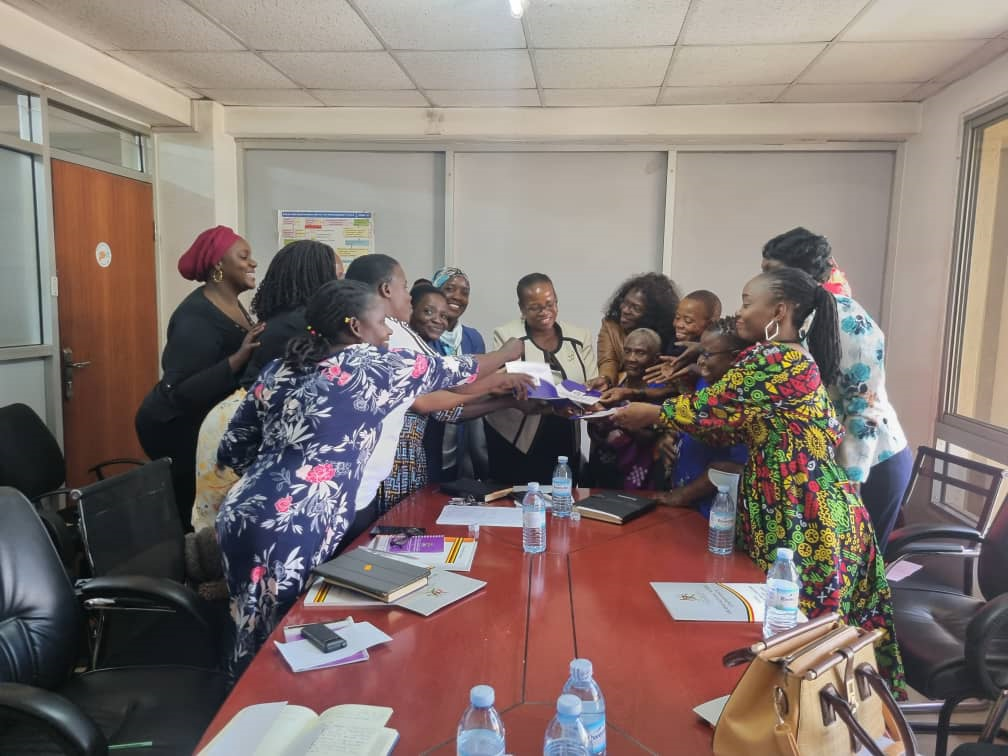Advocacy Meeting Sparks Collaboration Between WHRDs and Ministry of Gender

The WHRs sharing some reading materials with the Commissioner for Gender and Women affairs Ms Angella Nakafero
In a recent meeting held on 30th August 2023 at the Ministry of Gender Labour and Social Development (MOGLSD), the Commissioner for Gender and Women Affairs, Ms. Angela Nakafero, convened a gathering that held discussions for women’s rights and gender equality advocates. The meeting aimed to bridge the gap between Women Human Rights Defenders (WHRDs) and the ministry, fostering a deeper understanding of each other’s work and challenges.


The WHRds Interacting and sharing their experiences with the commissioner
Objective 1: Introducing WHRDs to the Ministry
Commissioner Angela Nakafero began by expressing her heartfelt appreciation for the tireless efforts of WHRDs in championing women’s rights. She acknowledged the ministry’s pivotal role in empowering women to stand up for their rights but also acknowledged a gap in engaging with these dedicated WHRDs. She recognized the valuable experiences WHRDs bring to the table, especially in areas such as combating Gender-Based Violence (GBV) and advocating for the rights of ethnic minorities.
Objective 2: Understanding MOGLSD Operations
Commissioner Nakafero elaborated on areas where WHRDs and the ministry could collaborate effectively. This collaboration includes shaping gender policies within national development plans, gathering crucial gender-related statistics, and enhancing the capacity of government agencies. She encouraged WHRDs to work closely with the Uganda Women Parliamentary Association (UWOPA) and emphasized the significance of advocacy grounded in evidence.
Brenda Introduces WHRDN-U:
Brenda Kugonza, the Executive Director of the Women Human Rights Defenders Network-Uganda (WHRDN-U), took the floor to introduce her organization. She highlighted WHRDN-U’s wide-ranging influence across the nation and its diverse membership, which encompasses activists advocating for various rights, including land rights, GBV, and environmental issues. Brenda emphasized the formidable challenges faced by WHRDs, such as discrimination, violence, and a lack of support. She went on to outline WHRDN-U’s three core programs: capacity development, protection, and advocacy.
Objective 3: Sharing Challenges and Work of WHRDs
During the meeting, several WHRDs courageously shared their personal experiences and challenges. These experiences included resistance encountered while combating Female Genital Mutilation (FGM), the neglect of indigenous Batwa people, discrimination against women with disabilities, domestic violence among HIV-positive women, attacks on shelters for GBV victims, challenges in the mining sector, and the critical need for legal knowledge.
The meeting not only facilitated a deeper understanding of the important work carried out by WHRDs but also marked the beginning of a potential collaboration between these dedicated WHRDS and the Ministry of Gender Labour and Social Development.
The Commissioner for Gender and Women Affairs, Ms. Angela Nakafero, has not only acknowledged their commendable work but also pledged her support to fortify their endeavors. Recognizing the challenges faced by WHRDs and the importance of their mission, Commissioner Nakafero committed to a series of initiatives aimed at empowering and collaborating with WHRDs.
- Creating Spaces for Engagement: Commissioner Nakafero’s commitment begins with the creation of dedicated spaces for engagement with WHRDs. WHRDNU members will receive invitations to participate in various ministry events, including the prominent 16 Days of Activism campaign. This step promises to provide WHRDs with a platform to amplify their voices and advocate for women’s rights on a broader scale.
- Introducing WHRDs to District Gender Focal Persons: To foster collaboration and protection for WHRDs who are at the forefront of demanding accountability for government programs like the Uganda Women Entrepreneurship Program (UWEP), the ministry plans to introduce WHRDs to district gender focal persons. This strategic alliance aims to provide WHRDs with local support networks and ensure their safety while pursuing their crucial work.
- Participation in WHRDs Celebrations: As a tangible gesture of solidarity and recognition, Commissioner Nakafero commits to participating in celebrations organized by WHRDs to commemorate WHRDs Day on 29th November. This involvement not only underscores the ministry’s support but also highlights the invaluable contributions of WHRDs to the empowerment of women in Uganda.
- Introduction to the National GBV Reference Group: The Ministry of Gender will facilitate an introduction between WHRDNU and the National Gender-Based Violence (GBV) Reference Group. This connection promises to enhance the coordination of efforts against GBV and strengthen the capacity of WHRDs in addressing this critical issue.
Commissioner Nakafero’s proactive approach signifies a promising step towards greater collaboration and support for WHRDs. By opening doors to engagement, introducing them to key stakeholders, and actively participating in their celebrations, the Ministry of Gender and Women Affairs demonstrates its commitment to advancing women’s rights and gender equality in Uganda. This partnership holds the potential to further amplify the impact of WHRDs and protect the hard-earned gains in the battle for gender equity.
